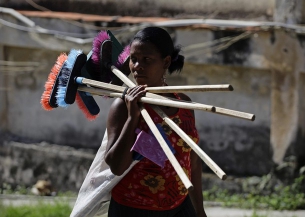
In less than a month, the Communist Party’s official newspaper published, in its weekly Letters to the Editor column, three critical opinions from those who are licensed to practice the fourth most popular self-employment activity for Cubans.
Officially, the activity is called “Producer/seller of miscellaneous items of use in the home.” The legislation that regulates the sector does not specify if it is obligatory to engage in both actions. However, from the presence of these self-employed on the main thoroughfares of the city and the increase in licenses granted by the State, we can presume that it is legal to be a seller alone, without also being a producer.
On May 6, a reader of Granma recounted his experience when he unsuccessfully looked for an electrical resistor in the hard-currency stores in Central Havana and Old Havana. As he wrote, he found them in the stalls of the self-employed on Neptune Street, for a price of 10 CUC (250 Cuban pesos), when in the hard currency stores they are often sold for less than 5 CUC.
“I really do not need any analysis on this subject as it is obvious that this is not allowed, and that those who should enforce the regulations are not doing it will, allowing others to live of our work,” said the reader to conclude his letter.
For his part, José Julio, a disabled self-employed man of 58 with a stall in the central Calzada de Diez de Octubre, says, “I do not force anyone to buy from me. The law says self-employment prices are negotiated freely. If they think I sell it for too much, then don’t buy from me.”
On May 20, another reader wrote in Granma: “The state offers a package of four steel wool pads for one CUC (24 Cuban pesos), and these are quickly monopolized by those self-employed who then sells them to 10, 12 or 14 Cuban pesos each, or at times the prices is more than 200% higher than the official price.”
And here’s the crux of the matter: the law forbids the self-employed to sell industrial goods acquired in the established commercial network, as well as food products pre-prepared by the established network on the Island. Also, they must trade in their own services and products exclusively, utilize primary materials in these activities, and show inspectors proof of this legality. But the only way to get the merchandise is to acquire it in the state retail markets, because that is the only legal outlet recognized by the authorities, as to date the State has not created any wholesale markets.
Granma has not yet published a single opinion in favor of the self-employed who engage in sales activity, nor any article that reflects the legal contradictions. Apparently, the law and Granma agree to put them between a rock and a hard place.
Originally published in Diario de Cuba.
29 May 2011
